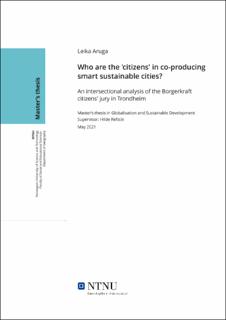| dc.description.abstract | This thesis uses the citizen co-production initiative Borgerkraft in Trondheim as a case study to explore the function of citizen participation in smart sustainable city work. More specifically it looks at the use of a citizens’ jury in the project. By interviewing municipal staff, researchers and a citizen involved in the Borgerkraft project and others who are engaged in Trondheim’s smart sustainable city work, the thesis provides a detailed account of how a citizens’ jury was utilized in the project to achieve greater inclusiveness of citizens and provide solutions to promote local sustainability efforts through a democratic forum. Through a near-random selection of citizens, the Borgerkraft jury created a ‘different’ participatory space that brought together citizens who were unlikely to cross their paths, including those who were not active in public. Being the first experiment of a citizens’ jury in Norway, the overall experience of the project was recounted positively by research participants. Building on a relational understanding of power and identities based on intersectionality theory, however, the findings point to the problematic nature of how citizens were conceptualized under the project as individuals disconnected from collective spaces where political agencies are formed. While other participatory methods also have their own challenges in overcoming unequal political representations, the profile of citizens created through an uncritical use of categories in Borgerkraft reflected the lack of concern over including most politically marginalized groups within the specific context of the project. The use of a citizen participation method centered on democratic values was overshadowed by underlying assumptions concerning the roles of citizens that limited their ability to challenge fundamental premises in the project. The findings in the thesis underscores the relevance of analyzing citizen participation through an intersectional lens which keeps the focus on the process of reproducing social inequalities in participatory spaces by scrutinizing taken for granted assumptions. As citizens’ juries are being planned for further use in Trondheim while also gaining interest across Norway, this thesis makes a timely contribution to analyzing how they work as a practice of citizen co-production. | |
